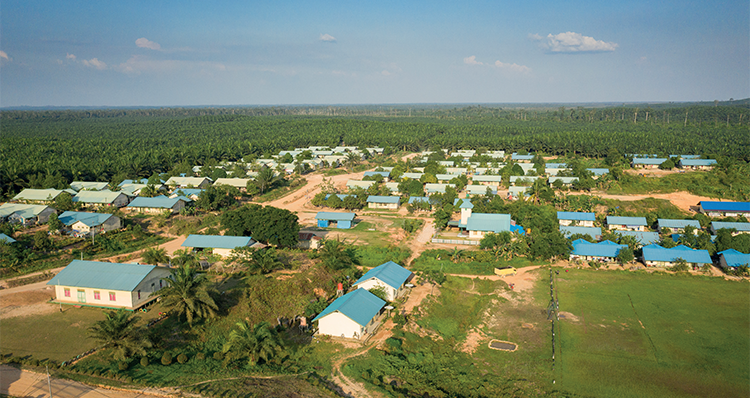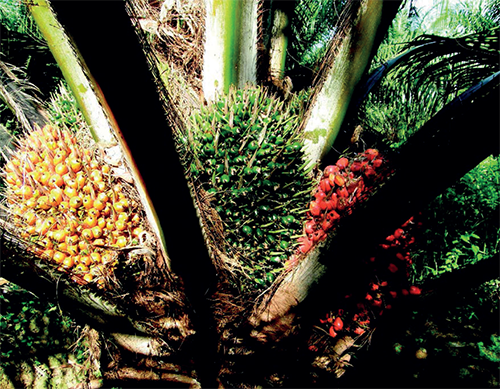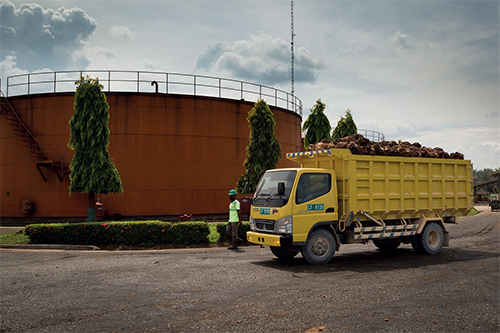
REA Holdings
A sustainable state of mind
Principally engaged in the production and sale of crude palm oil and crude palm kernel oil, the actions of R.E.A. Holdings plc (REA) are helping to counter some of the misconceptions of a hotly debated industry
A fully listed UK public company established in 1906, R.E.A. Holdings plc (REA) originated from a London plantation agency house called The Rubber Estate Agency Limited. Today, REA is principally engaged in the cultivation of oil palms in the province of East Kalimantan in Indonesia and in the production and sale of crude palm oil and crude palm kernel oil.
“It was in 1982 that REA, together with two other UK plantation companies, started a scheme for the development of a new oil palm estate on a 6000 hectare concession in North Sumatra, called the Tasik Project. This was an important step in the development of the REA group’s latter day Indonesian interests,” explains REA Holdings’ Managing Director, Carol Gysin. “REA subsequently divested its Sumatran and other interests and, recognising the potential in East Kalimantan, set up to develop a new, single site oil palm scheme in 1989. The first nurseries were established in 1992, and REA now holds some 75,000 hectares of land allocations, of which approximately half is planted with oil palm.”
Palm oil is a much-discussed commodity, but, as Carol goes on to detail, there are a number of misconceptions that people have about it and the way it is sourced. “Palm oil is the highest yielding edible vegetable oil, with oil palm providing approximately 35 percent of the global supply of major vegetable oils from around nine percent of the land cultivated,” she notes. “Oil palm also yields four-to-seven tonnes of oil per hectare compared with yields of less than one tonne per hectare for competitor oilseed crops.
“When palm oil is grown and produced responsibly, working in close conjunction with local communities and governments, the land farmed can be managed to control and reduce the environmental impact. This is something we are dedicated to and we promote responsible practice throughout all the areas that we operate.”
Palm oil is a perennial crop, meaning that unlike most other crops which are annual, it has a productive lifecycle of at least 25 years. This means that, rather than being replanted every year, existing palms can be harvested over the course of 20 plus years. The vegetable oil is a great source of tocotrienols, a form of vitamin E, and studies show that this antioxidant provides protection to the body’s cells that can reduce the risk of certain health problems such as heart disease and cancer. Crude palm oil is also the richest natural source of carotenoids which contribute to combatting vitamin A deficiency. Polyunsaturated oils, such as soybean oil, rapeseed oil and sunflower oil also require partial hydrogenation before they can be used for shortening and other solid fat applications, whereas crude palm oil does not.
“We understand consumers’ concerns regarding the production of palm oil, and we share many of these but, as we have shown, it is possible to produce palm oil in a sustainable manner,” Carol stresses. “Major palm oil producers have adopted policies, such as NDPE, in the past few years that adhere to much tighter standards and the sector needs to continue to address concerns and prove to consumers that it is possible to produce palm oil sustainably.
“REA works to improve yields (both by planting higher yielding cultivars produced by professional plant breeders as well as crop management decision-making driven by science to produce site-specific best management practices) in order to reduce pressure on remaining forest land. The best way to educate consumers is to show real-life examples of sustainable supply chains involving smallholders, communities and companies implementing sustainable best practices, including conservation efforts, to optimise production whilst minimising environmental impacts. Verification and certification schemes to demonstrate that desired stakeholder outcomes are being achieved must be practical and fit for purpose.”
REA Holdings’ President Director in Indonesia, Luke Robinow, continues along a similar vein: “We take our responsibility to develop land according to best practice guidelines and with respect to local communities incredibly seriously. We have been members of the Roundtable on Sustainable Palm Oil (RSPO) since 2007 and adhere to the International Sustainability and Carbon Certification (ISCC) and Indonesian Sustainable Palm Oil (ISPO) standards.
“More recently – since 2012 – we have generated electricity at our two methane capture facilities using the by-products of processing oil palm crop. Effluent from our mills is reprocessed at our biogas facilities which supply renewable electricity to our mills, estates, housing, and the surrounding communities. The  electricity is distributed across our operations and local communities. Before the installation of our power plants, generators fed by diesel were used to power our operations. The switch to a renewable energy source has ended our reliance on diesel generators and successfully helped to reduce the GHG emissions of local communities by reducing their reliance on diesel generators for electricity. Other by-products are not wasted either. The fibre from fruit bunches is used as fuel for the boilers, empty fruit bunches are recycled as organic compost and boiler ash is used to make bricks for houses.”
electricity is distributed across our operations and local communities. Before the installation of our power plants, generators fed by diesel were used to power our operations. The switch to a renewable energy source has ended our reliance on diesel generators and successfully helped to reduce the GHG emissions of local communities by reducing their reliance on diesel generators for electricity. Other by-products are not wasted either. The fibre from fruit bunches is used as fuel for the boilers, empty fruit bunches are recycled as organic compost and boiler ash is used to make bricks for houses.”
Today, REA can also be found working with an international funding body to establish a micro-finance scheme for smallholder farmers to access funds for intensifying their oil palm yields and develop alternative revenue streams in order to reduce pressure on forest areas outside REA’s concession areas, as well as to improve the traceability of the group’s produce (fresh fruit bunch or FFB) supply chain. Other initiatives include fire prevention and training for local community groups, and programmes to promote greater efficiency of waste management and recycling schemes in conjunction with regional initiatives.
“Conservation work is also a principal element of REA’s policy towards the achievement of sustainability,” Luke states. “Currently a total of approximately 20,000 hectares have been set aside as conservation reserves within the group’s land bank, accounting for some 23 percent of the group’s land. REA’s conservation department (REA Kon) was established in 2008 and aims to exceed, rather than just meet, all the requirements of the sustainability bodies by which the group is certified. REA Kon’s conservation efforts are augmented by close technical cooperation with independent research scientists and experts from local and international institutions and universities, as well as with Indonesia’s environmental NGOs.”
Globally, the palm oil industry is believed to support some three million jobs. The REA group presently employs around 8,000 people. “We endeavour to provide competitive salary packages, opportunities for career development and a decent standard of living on the estates for employees and their families,” Luke enthuses. “We offer an annual programme of in-house training, participation in external training courses and regular outbound activities for our employees.
“Wherever possible the group seeks to employ local people and contractors in an effort to contribute to the local economy and create a stable workforce. We also buy oil palm FFB from 4,300 smallholder farmers through 51 local producer cooperatives providing regular incomes for these farmers and their families. These smallholders and communities are provided with training free of charge on how to improve their yields, as well as financial literacy and business development training.”
Permanent employees and their families who wish to live on the plantation are eligible for housing, which is all equipped with electricity and potable water, while free medical care and schooling is also available for residents. “Good quality housing and community facilities for employees are a priority for REA,” Luke says. “The group continues to build houses using ‘batako’ bricks, which are produced in-house by mixing boiler ash from the mills with cement. Use of this material has significantly reduced both the cost and environmental footprint of new houses in recent years. Each year, there is a programme for building new houses and renovating existing properties and infrastructure for families living on the group’s estates. Village emplacements are provided with medical clinics, crèches, mosques, churches, schools, sports facilities and markets.”
As global populations and GDP continues to grow, the use of palm oil as the most widely used vegetable oil, is set to continue to increase. This, accompanied by the increasing use of biofuels, which can significantly lower carbon emissions, means demand for palm oil will continue its upward trajectory. “As discussed, the challenge is for palm oil producers to prove to consumers that they can act sustainably. Once we overcome that hurdle, the opportunities become even more significant,” Carol enthuses. “As the world continues to demand the lowering of carbon emissions, palm oil, given its higher yields, is ideally placed to provide a greater share of the supply of vegetable oils to meet increasing demand. By investing in yield intensification and emerging technologies, palm oil companies can play a vital role in meeting rising demand for both oil and reduced emissions going forward, both internally and externally through the communities with which they work.”
For REA, its aim is to continue to grow through optimising the use of its available land areas while continually striving to minimise the environmental impacts through agricultural best practices. “We aim to plough back wealth into the local community through responsible expansion of smallholder schemes and developing further renewable energy sources, allowing for potential gasification of vehicles, thereby further reducing use of fossil fuels and reducing our carbon footprint,” Carol concludes. “Ultimately, while retaining our responsibility to our investors and other stakeholders, our role is to provide a healthy legacy for future generations in the company and in the local community in Indonesia, where we recognise our status as a guest.”
REA Holdings
www.rea.co.uk
Products: Crude palm oil and crude palm kernel oil